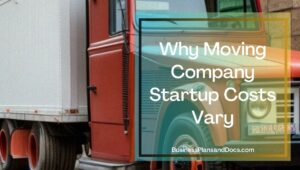A moving company provides essential services that people, businesses, and institutions use every day. Like every business, there are certain costs to consider before you can get started.
Moving company startup costs vary from a few hundred dollars to about $750,000 for a medium scale business structure. These startup costs include legal responsibilities, marketing, rent, utilities, business materials, and operational costs.
It is difficult to pin down an exact estimate for a moving company startup cost, but paying attention to the details that matter will help you calculate a number that matches your situation. Keep reading to learn general estimates as well as which factors vary the most.
Breakdown of Moving Company Startup Costs
The startup costs of a moving company usually fall into these categories:
- Legalities
- Marketing and promotions
- Rent and utilities
- Equipment and materials
- Operational costs
There are other details to consider (included as “miscellaneous expenses”), but the bulk of your budget will touch on these areas.
Legalities

Any business needs to take the time to get its legal ducks in a row, regardless of its scale. The average legal expenses for a moving company include:
- Registration costs – $750
- Licensing and permits – $3,500
- Insurance – $15,000 total premiums for a year (general liability, workers’ compensation, automobile coverage)
These are essential to business operations. Regardless of where you live, you need to register your business appropriately and secure the proper paperwork to get started. Every state has at least a general liability requirement for any business.
Marketing and Promotions
The average cost for marketing and promotional costs sits around $3,500. This is how your business:
- Attracts new customers
- Facilitates referrals
- Attempts to retain customers for their next move
There are plenty of tools out there to help you with marketing and promotion, ranging from free social media business accounts to paid professional assistance.
Marketing is also not a stagnant cost, but the number tends to be larger at startup. This is the stage when you need to attract the most customers, and failing to start strong can lead to long-term struggles.
Rent and Utilities
Rent for a year can cost up to $105,000, but you also need to create an estimate for:
- Phone bills
- Electricity
- Water
These costs usually only apply to your office building or warehouse location, while the maintenance and operational costs of vehicles is accounted for elsewhere.
Rent may not apply if you own the lot that you work off of, but utilities are a constant rotating cost. Even if your business is home-based, expect a spike in utility costs when you start.
Equipment and Materials
There are plenty of aspects to consider for equipment and material costs, including:
- Office supplies – $750
- Moving trucks – $450,000 (two 50 ton moving vehicles)
- Website development and launch – $600
As you can see, the bulk of your equipment costs lay in your method of transportation. This may seem high, but your moving vehicles are the backbone of your business. Without investing properly, you might be left with inadequate or faulty vehicles.
It also makes sense to have at least two vehicles you can rely on. If one ever is out, the other vehicle prevents you from stopping operation completely. Business may slow, but you have a better chance of keeping momentum with a backup plan.
Operational Costs
Incorporate an estimate for operational costs in your startup budget. For a moving company, this includes:
- Salary for all employees
- Fuel and maintenance for the vehicles
- Ongoing bills
For a medium-scale business this can easily run 120,000. These details vary greatly, so take your time to pin down an estimate. Hiring a professional to help you pin down these details will help you create an estimate that is authentic to your moving company.
Understanding these operational costs and planning for them helps you get through the slump that occurs at the start of your business. This is where the reality of the costs of running a business comes to light, but preparing for them keeps you in a better mindset.
Miscellaneous Expenses
You should always plan for miscellaneous expenses to give your startup budget room for comfort.
These might include:
- Business phones
- Stationary
- Emergency maintenance
Miscellaneous costs can make or break your budget, so including an estimate ensures your essential values are minimally affected.
How to Start a Cosmetics Manufacturing Business
Why Moving Company Startup Costs Vary

The estimated startup cost is a large number, especially if you are looking for a business to start at a low cost. The truth is, the moving industry covers a lot of ground, and you can usually mold these costs to fit what you have to offer.
Details vary greatly depending on:
- The products and services you offer
- The location of your business
- What level of professional assistance you employee
- How you market
- How you invest in your employees
These details also affect the potential gains of your moving company, but you need to make these decisions before you start.
Products and Services Offered
Moving businesses cover plenty of ground, and the scale of your business affects what you need to start. Some variations include:
- Vehicle and fleet size
- External services offered (specialty packaging, supplies bundles, storage)
- Length of moves (local vs. cross country)
You can look to cut costs by buying vehicles used, but you need to weigh the risk of more immediate maintenance costs. The size of these vehicles can have the greatest effect on your startup costs, ranging from a few thousand for a moving van to hundreds of thousands for semi-trucks.
5 Tips for Writing a Business Plan for a Tour Company
Location
Location affects quite a bit, including:
- Customer demographics
- Legal requirements
- Legal fees
Location does not only refer to state details. You need to pay attention to location impacts on all levels, including:
- State
- Federal
- Municipal
Take the time to reach out to your city council and your state government to make sure you have all your bases covered. You may need more permits than originally thought, and failing to take care of these issues at the start leads to costly fines and fees.
Professional Assistance
While it is possible to start a moving company with no professional assistance, having someone else look over the process often saves time and money by:
- Developing a workable business plan
- Constructing a thorough marketing strategy
- Completing a SWOT analysis
Attorneys help keep you clear on the legal side by ensuring proper registration, drafting any contracts you may need, and offering their overall legal expertise.
While this costs plenty at the start, it is often worth the long-term benefits. Working with a well-constructed plan helps you earn more in the long run, and the legal coverage prevents those fees and fines.
Marketing Scale
Marketing is what brings in customers, and there are several routes to pursue. Examples include:
- Flyers
- Television or radio ads
- Online ads
- Billboards
- Social media
You need to consider paying for the development of these marketing campaigns. Thinking them up on your own is great, but marketing professionals know the ins and outs of what catches the consumers’ eye.
Other aspects to consider include:
- Design development
- Ongoing campaigns
- Social media management
The last point is another negotiable point. Most business accounts on social media platforms are free, and pretty much everyone knows how to make a general post.
Social media managers are often well worth the cost because they keep your content consistent and on-point. They do not come free, but they can be the key to maintaining relationships with previous customers.
Employee Investment
Moving might seem straightforward, and most everyone knows how to put items in a box and load the box into a vehicle. The investment tiers for employee development include:
- Training
- Employee rewards
- Uniforms
Training can be as simple as an onboarding meeting or as complex as investing in proven corporate strategies. While the cheaper option undoubtedly works, using a specific system can help get everyone in the right mindset and on the same page.
Employee rewards can be merit based or simply employed to improve morale, or you can choose to go without them. The same applies to uniforms, which may get a sense of duty and uniformity.
The key is choosing options that fit your budget and what you need in a business. You can always change things later on, but consider what is important to give your moving company a strong start.
How Do You Make Money Renting Office Spaces?
Frequently Asked Questions
Can I start a moving company with no money?

It is possible to start a small-scale moving company with items you already have (a truck or trailer and your person), but you still need to pay the costs for legal fees and licensing. Failing to secure these documents opens your business up for lawsuits and other major issues.
How much is the moving industry worth?
The moving industry, which also includes storage, is worth about $15 billion. There is a consistent need for moving services, and even the DIY industry pulls in about $22 billion per year.
What services can a moving company offer beyond relocation?
Moving companies can also capitalize on packaging sales and services, renting equipment, offering specialty moves (i.e. aquariums or instruments), and offering tracking or storage activities. These additions affect startup costs.
To learn more on how to plan your own moving company business click here!
Please note that the contents of this blog are for informational and entertainment purposes only and should not be construed as legal advice. Any action taken based on the information provided in this blog is solely at your own risk. Additionally, all images used in this blog are generated under the CC0 license of Creative Commons, which means they are free to use for any purpose without attribution.

About the author. A lifetime of Entrepreneurship.
Hi! My name is Shawn and I am a happy individual who happens to be an entrepreneur. I have owned several types of businesses in my life from a coffee shop (link here http://archives.starbulletin.com/2003/05/18/business/index.html) to an import and export business to an online review business plus a few more and now I create online resources for those interested in starting new ventures. It’s demanding work but I love it. I do it for those passionate about their business and their goals. That’s why when I meet new business owner, I see myself. I know how hard the struggle is to obtain and retain clients, finding good employees and making sure everything works together all while trying to stay competitive.

